October 12, 2025 – Offline Meditation Retreat Dharma Q&A, Happiness Citizen Volunteer Training
Hello. Today is the day when the Happiness Citizen volunteer training is held all day at Seonyudong Education and Training Center in Mungyeong.
After spending a night at Mungyeong Jungto Retreat Center yesterday, Sunim completed his morning practice and meditation, then started his day at 6 AM with a Dharma Q&A session with offline meditation retreat participants at the Meditation Center.

The meditation retreat participants spent five days and four nights from October 8 to 12, taking time to reflect on themselves through meditation with fellow practitioners amid the autumn scenery of Mungyeong Jungto Retreat Center. Today was the closing ceremony marking the end of the meditation retreat. Originally, participants were scheduled to watch a video Dharma talk, but upon hearing that Sunim would be staying at Mungyeong Jungto Retreat Center for a day, a request was made for him to give a Dharma talk in person, so this session was arranged suddenly.

After the participants requested a Dharma talk with three prostrations, Sunim gave a teaching about the reason for practicing meditation.
“Thank you for your hard work meditating for five days and four nights. As we go through life, there are times when we suffer or feel frustrated because things don’t go as we wish. Various agonies arise. But if you quietly observe animals in nature, what do you see? Animals like squirrels, rabbits, and deer don’t live in better conditions than us, yet they don’t cry out about how hard life is. They only struggle briefly when caught in a trap and feel the threat of death; otherwise, they live according to their abilities. Animals are neither busy nor lazy. They simply do what they need to do according to their given conditions.
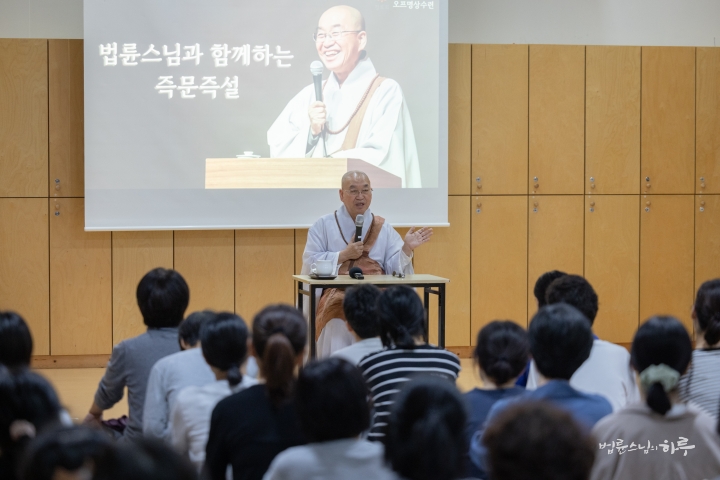
When You Stop Thinking, Nothing Is Happening
Yet we live in much better conditions and more favorable environments than those animals, and still say ‘life is hard.’ Even though we chose and wanted to do something, we say it’s difficult. It’s not that we suffer because we can’t get married; we get married, receive congratulations, and then say ‘married life is hard.’ We enter university and receive congratulations, but then say ‘university life is hard.’ We rejoice when we get a job, then say ‘work life is hard.’ We have children and receive congratulations, then say ‘raising kids is hard.’ These things don’t happen to other animals. So clearly there must be some contradiction.
If you look carefully, you can see that our suffering is created by our thoughts. It’s not actually difficult; it’s our minds that find it difficult. If you rest and stop your thoughts, almost everything becomes nothing at all. Unless someone is hitting you or causing direct physical pain to your body right now, all that suffering comes from mental processes in your mind. That’s why meditation is about resting your thoughts, relaxing your body and mind, concentrating on one point, and becoming aware of the state of your body and mind. When you concentrate like that, nothing is happening. Realizing that nothing is happening is meditation itself.
However, our thoughts arise constantly not only in daily life but also during meditation. Even during meditation, if we get caught up in thoughts, we get angry, cry, suffer, feel bored, and struggle while just sitting still. That’s why it’s difficult to escape from suffering. Let me give you the example of cigarettes. Not smoking is actually an easy thing to do—it’s doing nothing. Smoking is actually the harder thing to do. Yet feeling that ‘not smoking is difficult’ is because of addiction to cigarettes. Similarly, people who find it difficult to stay still have already become habituated to action. This habituation and addiction is called karma. Meditation is the practice of breaking free from this karma. Breaking free from addiction is called the cessation of karma. When that happens, we can live without suffering even in our daily lives.
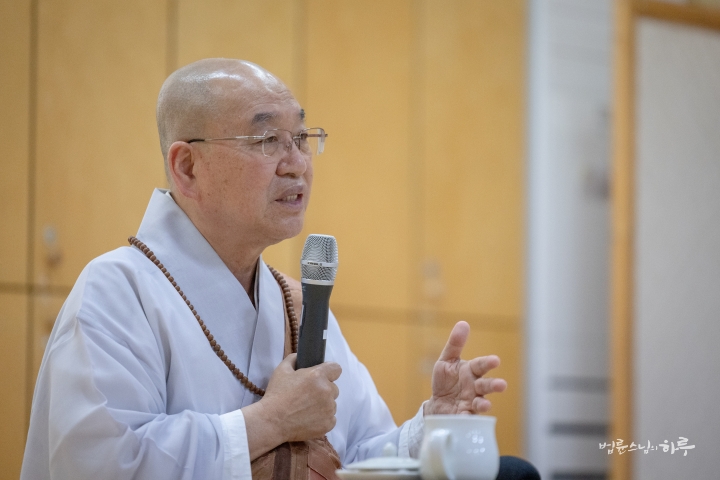
It’s Not Life That’s Hard, It’s Your Mind That’s Hard
In reality, animals like squirrels, rabbits, and cows live comfortably in their daily lives. We can live like that too. But people keep making excuses, saying things like ‘I have too much work’ or ‘Relationships are difficult.’ If that’s the case, then let go of everything, don’t form any relationships, and just stay still and comfortable. If you still find it difficult, then it’s entirely your own problem. If someone finds it hard to just sit still without smoking, we can say they’re already addicted to cigarettes, right?
You’ve all tried meditation for five days, but if five days isn’t enough to realize this, you might need to sit still and meditate for about a year before you finally have the great realization that ‘there’s no problem even when I’m just sitting still.’ However, after just five days of meditation like this, there’s a high chance you’ll return to your old habits as soon as you leave. As soon as you go out, you’ll order jjajangmyeon, and starting tonight, you’ll work all night again. Because of this pattern, things always remain the same. Now, if you have any symptoms or questions that arose during meditation, please raise your hand and ask.”
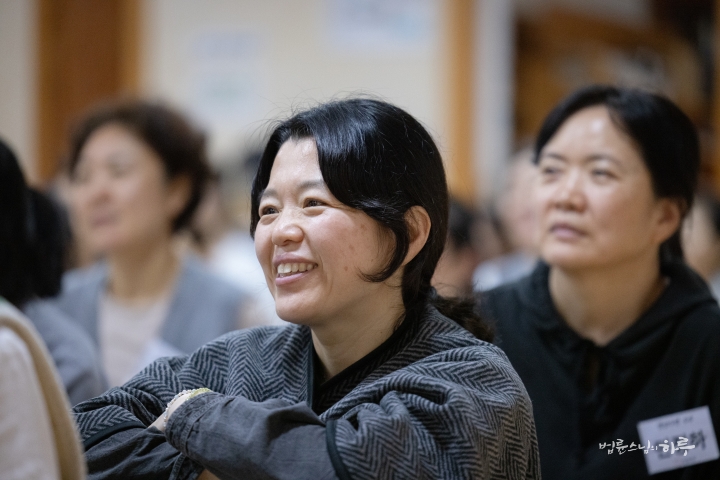
Next, Sunim received questions about things participants were curious about while meditating. After answering various questions for an hour, the dialogue concluded after 7 o’clock.
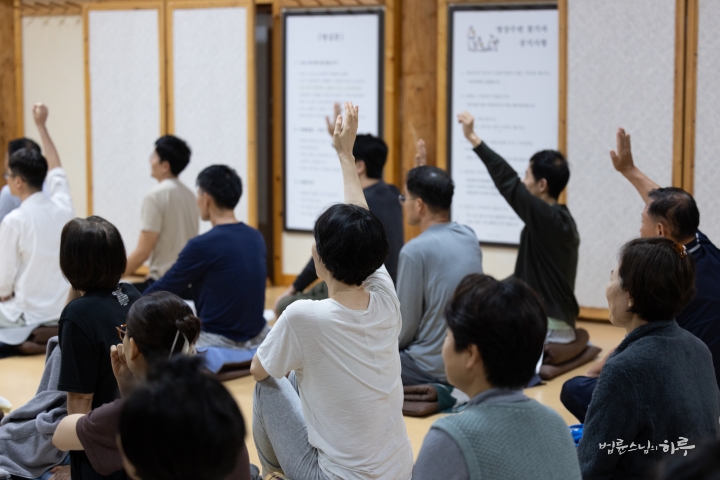
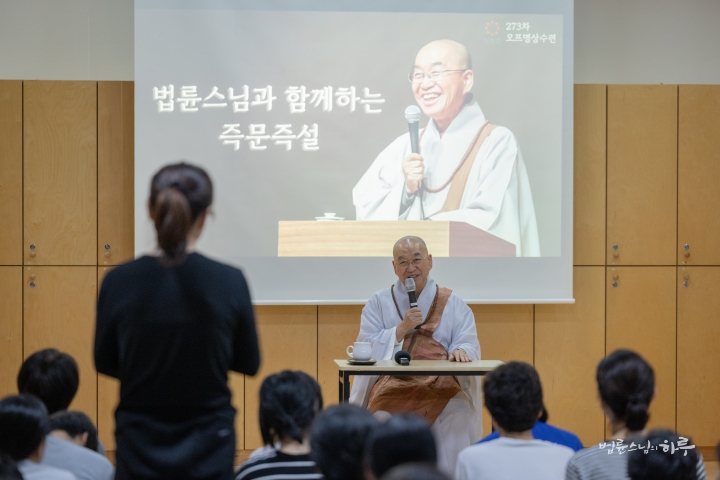
After taking commemorative photos, the meditation retreat participants proceeded with sharing their reflections and the closing ceremony, while Sunim headed to Seonyudong Education and Training Center to participate in the Happy Citizens volunteer training.
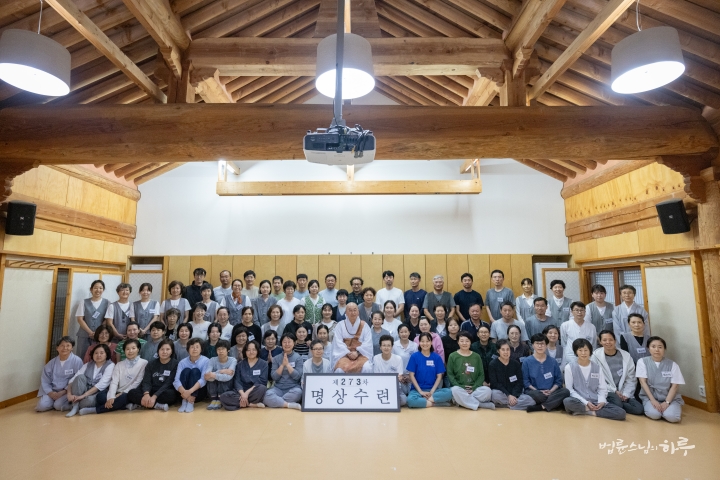
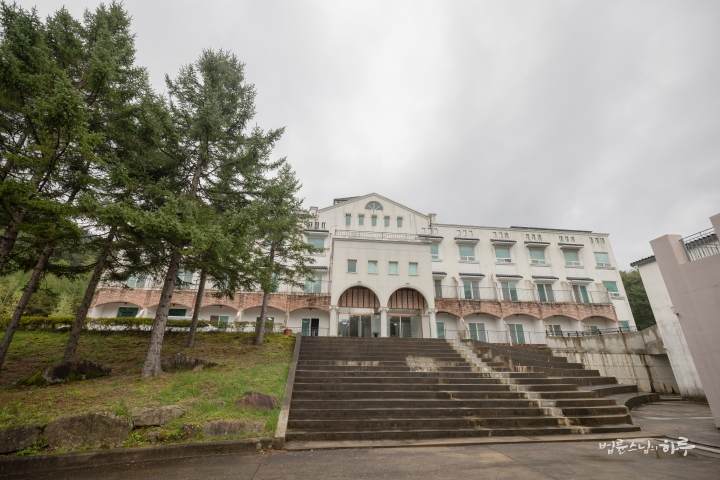
Upon arriving at the Education and Training Center, Sunim exchanged greetings with the resident members of the Sangha. The members greeted Sunim with three prostrations.
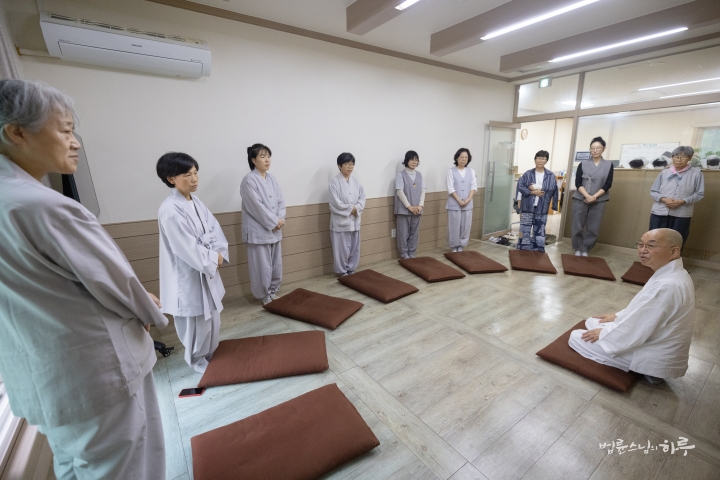
After exchanging pleasantries, they had breakfast and discussed the day’s schedule. Both the Happy Citizens volunteer training and the leading member retreat were being held simultaneously at the center today. The leading member retreat participants had requested time to dialogue with Sunim, so the location and time were coordinated.
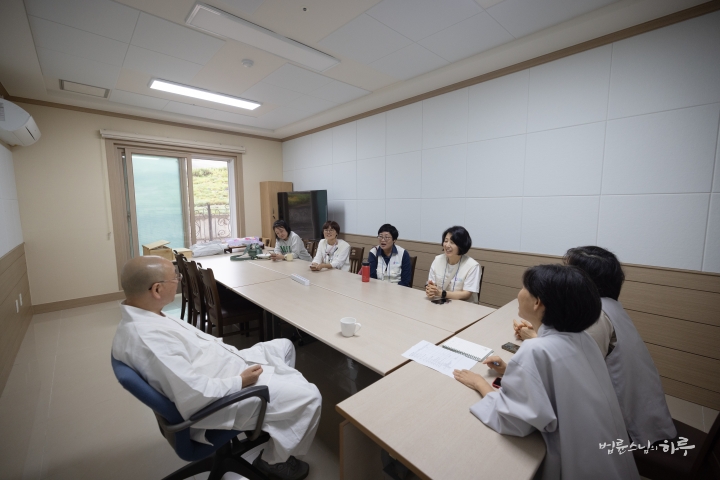
In the morning, an outing to Seonyudong Valley was scheduled with the Happy Citizens volunteers. Sunim departed a bit early to personally survey the outing route. The ground was completely wet from the rain that had fallen at dawn.
“The path is slippery, so someone might get hurt.”
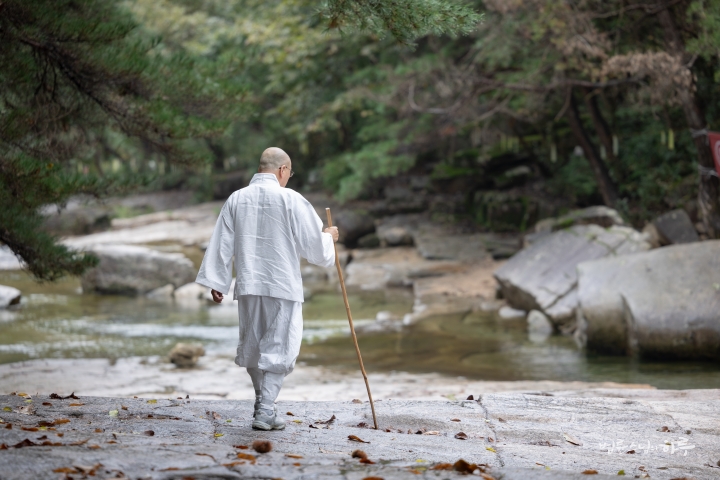
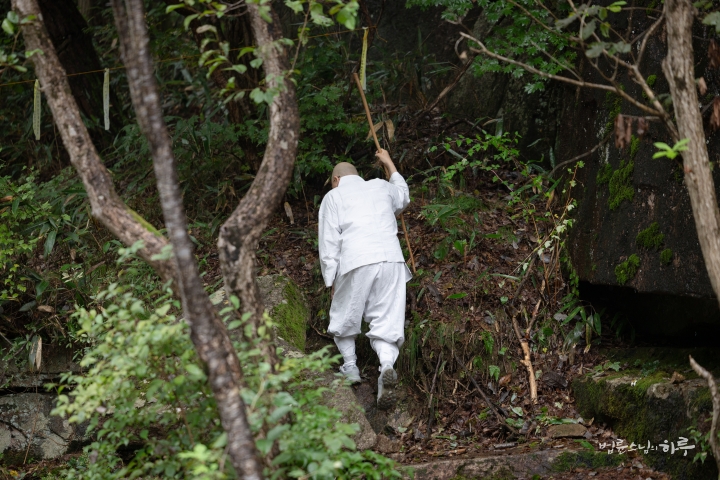
Sunim went to the Daeyasan Recreation Forest ticket office to ask for permission to travel along the road instead of the valley path. The ticket office staff readily granted permission.
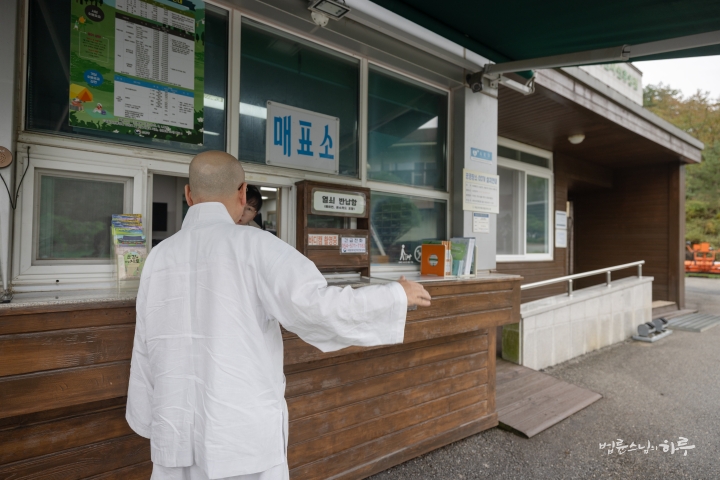
After thanking the ticket office staff, Sunim moved to the Daeyasan parking lot. About 260 Happy Citizens volunteers from all over the country had gathered in the parking lot. The Happy Citizens had been conducting various activities in their respective regions, including historical tours, Happy Dialogue lectures, and practical activities. Today was the first Happy Citizens volunteer training since the formation of the Happy Citizens group.
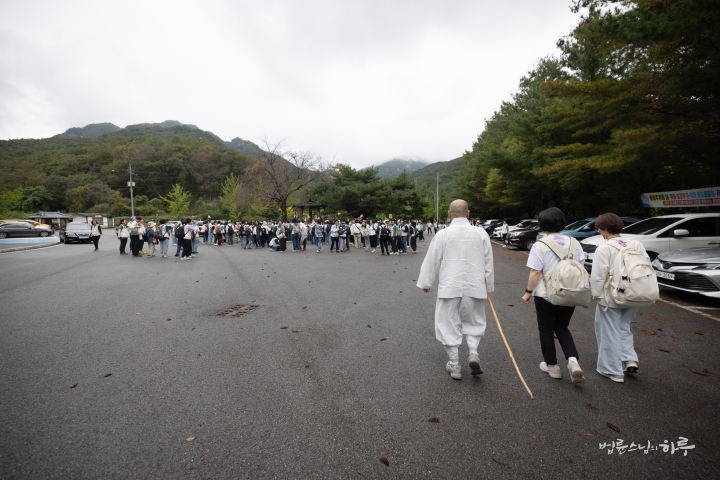
At 10 a.m., when Sunim arrived, the participants welcomed him with applause. Sunim introduced today’s hiking course.
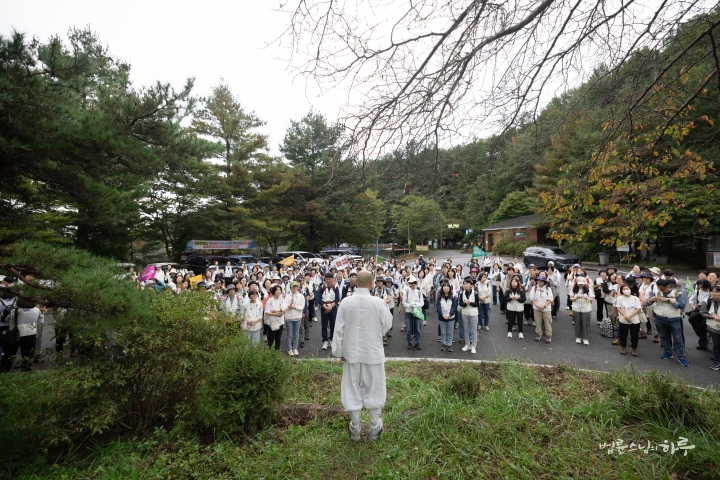
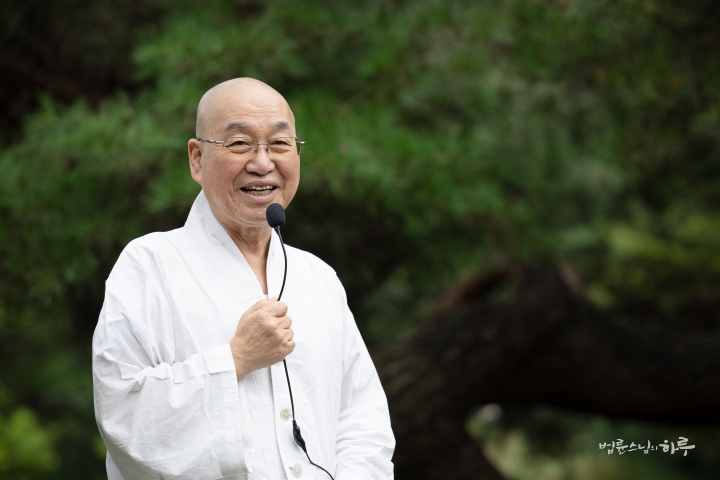
“The place where we’re hiking today is part of the Sobaek Mountain Range. Daeyasan is located between Mungyeong Saejae and Songnisan, and Yongchu Valley, where we’ll be hiking, is a valley between Daeyasan and Dundeoksan. It’s also called Seonyudong Valley. We’ll start from here and go up to Yongchu Falls. When coming down, since the path is slippery and someone could fall, we’ll come down along the fire road. We’ll have lunch at Hakcheonjeong in Seonyudong. Please be careful while hiking as someone could fall and break an arm or leg.”
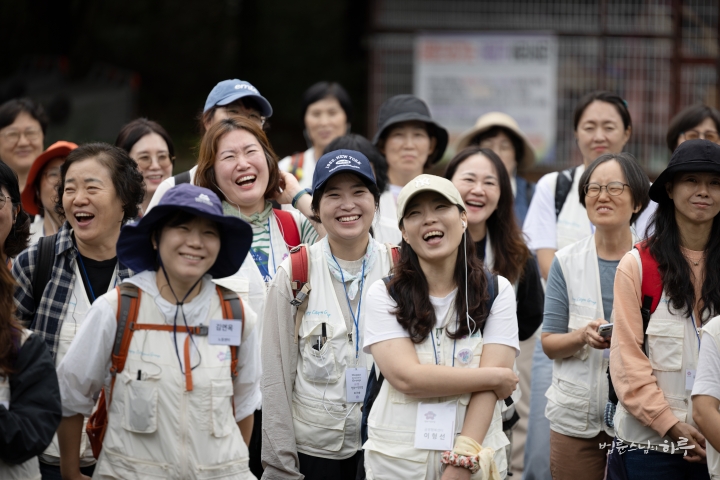
After Sunim’s explanation, they immediately began the outing to Yongchu Valley. Starting from the Daeyasan parking lot, they walked up the mountain trail toward Yongchu Falls.
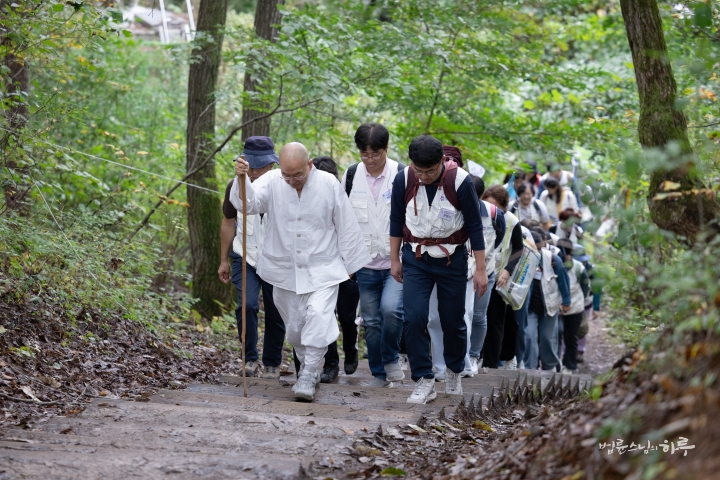
As autumn had just crossed its threshold, the leaves hadn’t turned colors yet, but the green trees and the cool flowing valley water still retained the energy of summer. The breeze was refreshing, and the sound of water was clear.
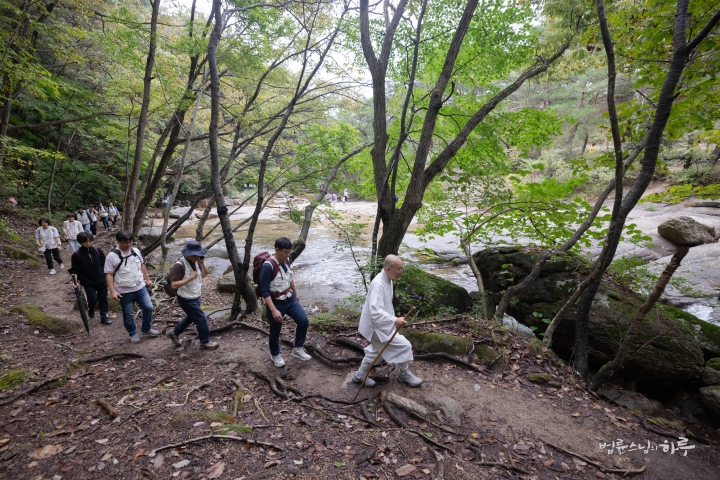
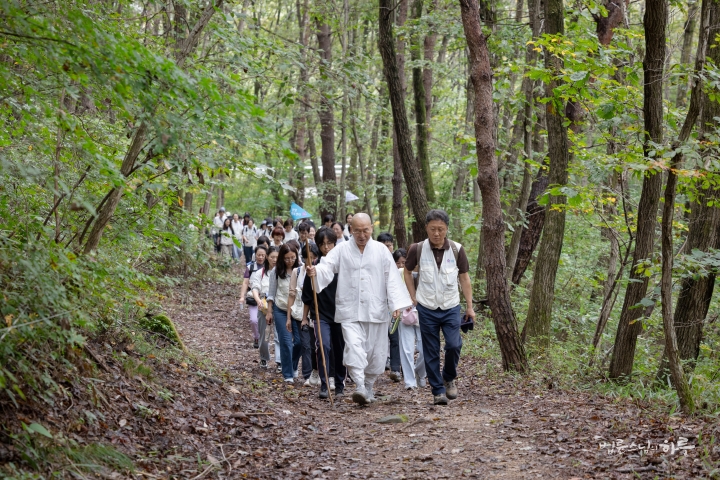
After walking for about 30 minutes along the mountain path beside the valley, Yongchu Falls appeared, spouting white streams of water between the rocks. The members paused for a moment to enjoy the refreshing atmosphere.
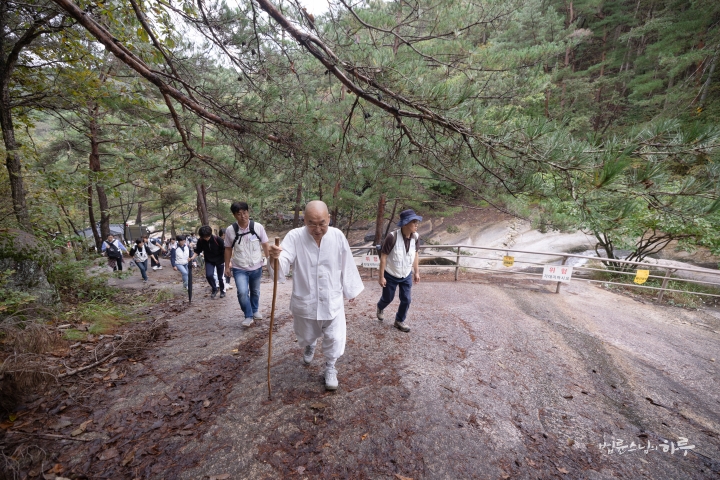

After briefly admiring the waterfall, they crossed the valley and descended the mountain along the path on the opposite side. After walking for a while along the trail covered with fallen leaves, a valley with deep, clear sparkling water unfolded before them. The rocks, water, and trees harmonizing under the autumn sky looked like a painting.
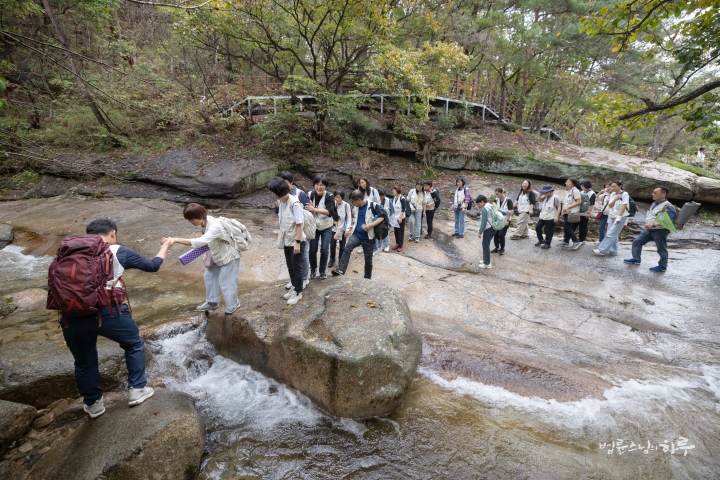
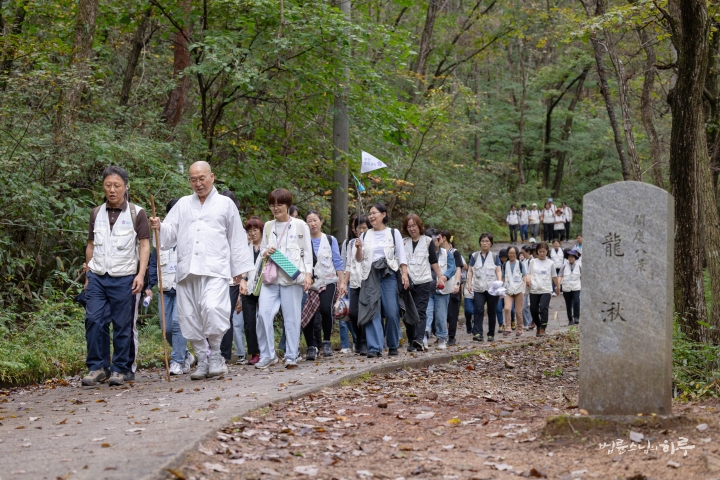
Upon arriving at Daeyasan Recreation Forest, Sunim once again thanked the ticket office staff. The Happy Citizens volunteers walked down the road in an orderly single file to avoid disrupting vehicle traffic.
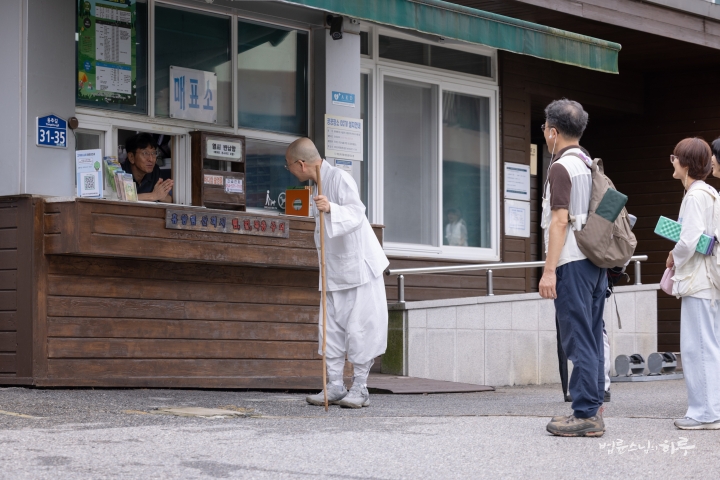
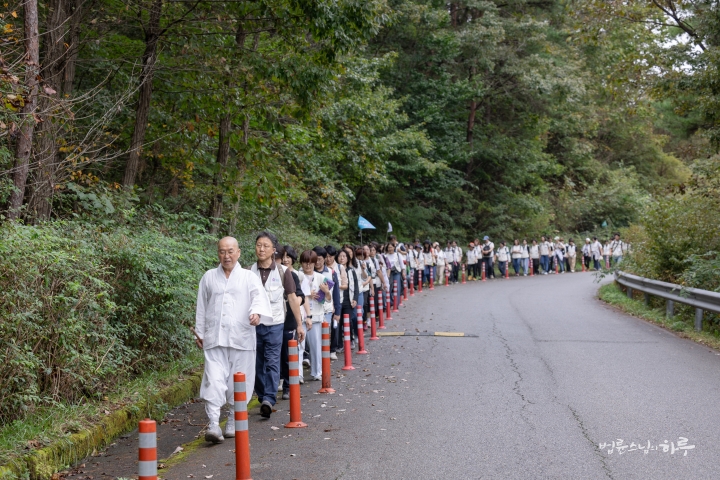
Arriving at Hakcheonjeong in Seonyudong, they decided to spread out on the wide rock terrace for lunch. Before dispersing, they divided into nine groups and took commemorative photos.
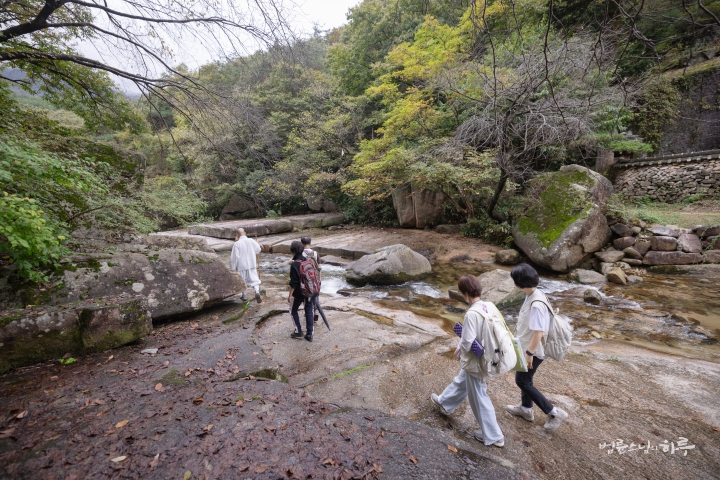
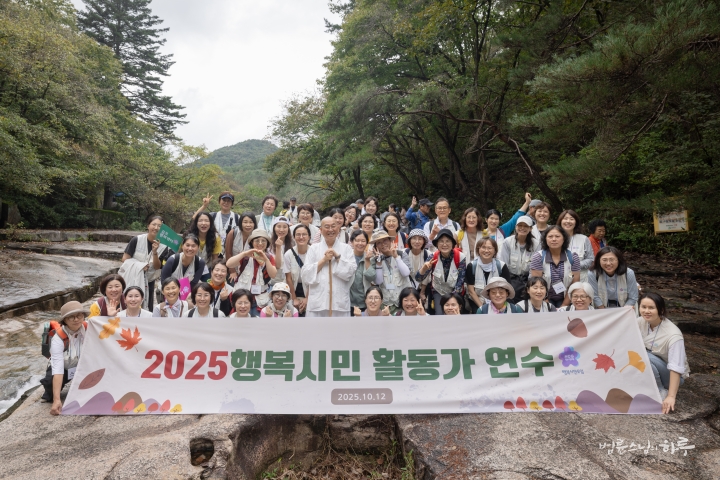
The volunteers took out their lunch boxes and sat in small groups, sharing stories about their practice and activities. Warm laughter spread far along the valley.
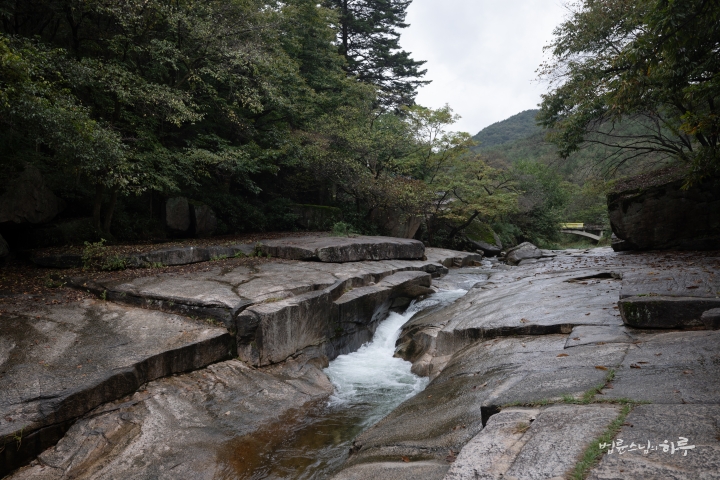
While the members began their lunch, Sunim immediately headed to Seonyudong Education and Training Center. Leading members were conducting a separate retreat program at the center. A request had been made to have a discussion session with Sunim during lunchtime. After a quick lunch, Sunim went to the main hall where the discussion was to be held.
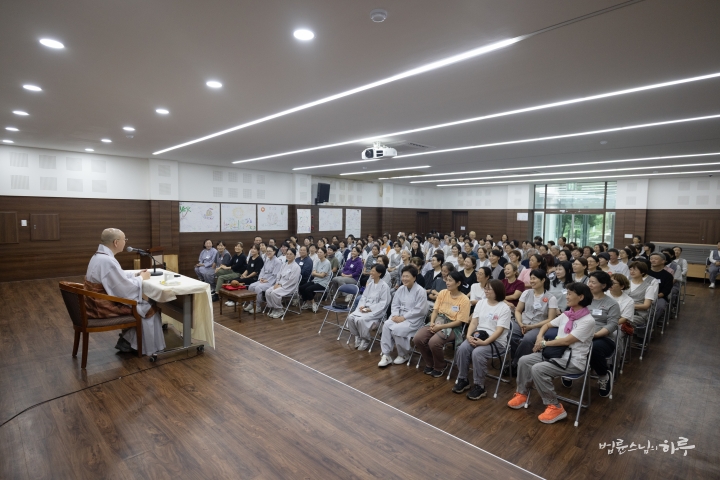
About 100 leading members were waiting for Sunim in the main hall. After they requested a Dharma talk with three prostrations, Sunim greeted them with a smile.
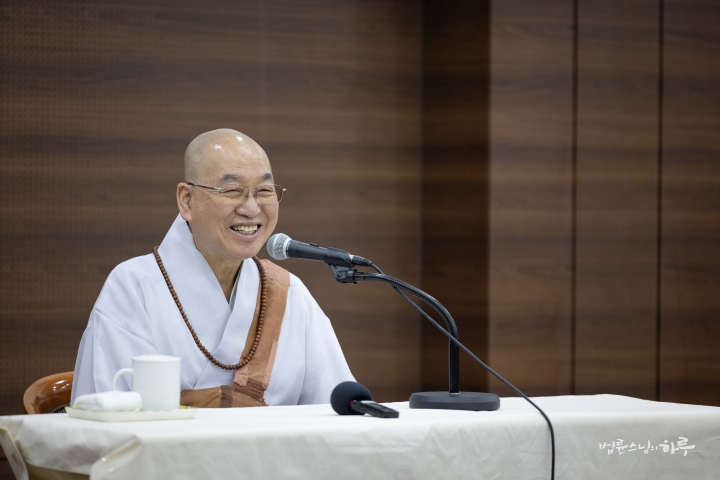
“I almost couldn’t have lunch because of this unplanned event. When you request a Dharma talk like this, I say ‘No thank you!’ (laughter) There’s a Happy Citizens volunteer training happening here today, and it’s currently lunchtime. At first, they said, ‘Since we’ve met, let’s just take a photo.’ Then it became, ‘It would be nice to talk briefly,’ and it kept getting longer. I don’t have anything particular to say, but if you have any questions while receiving the leading member training, let’s discuss them together.”
Sunim expressed his warm feelings in the Gyeongsang Province style.
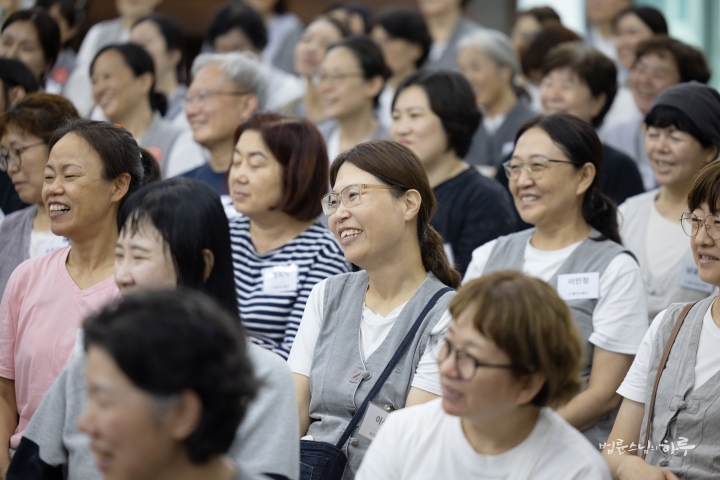
Next, questions were received about things participants were curious about while receiving the leading member training. Various questions continued for 40 minutes.
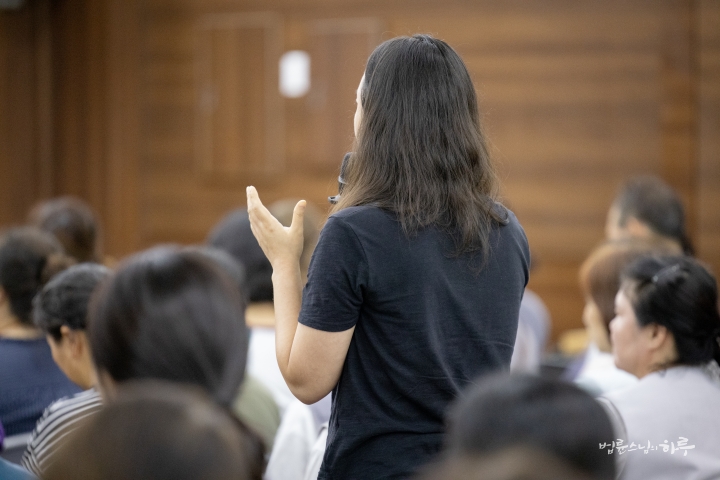
After the dialogue, Sunim gave encouraging words to the leading members.
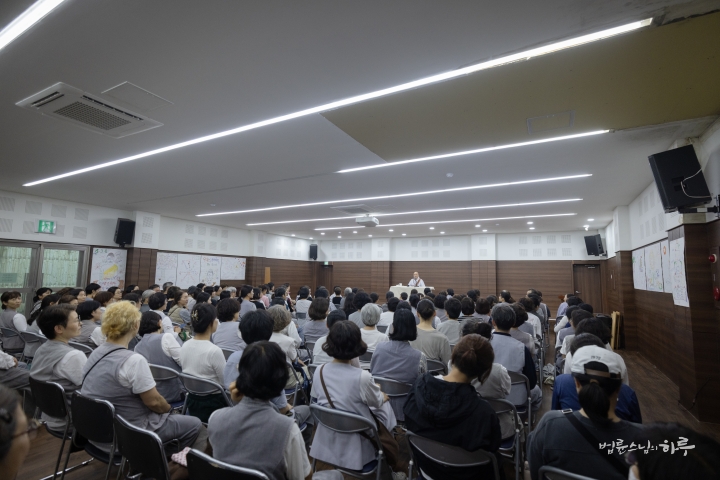
“Jungto Society’s practice method has the characteristic of being easy for anyone to do. Rather than emphasizing faith, it values understanding, and being rational, it has the advantage of being easy for many people to accept. However, conversely, it also has the weakness of lacking inner strength. What you understand and accept on your own stops the moment you don’t understand it. The reason you like me, saying ‘Sunim, Sunim,’ is because you understand and like it yourself, but if your mind changes, I quickly become an enemy. This cannot be called practice.”
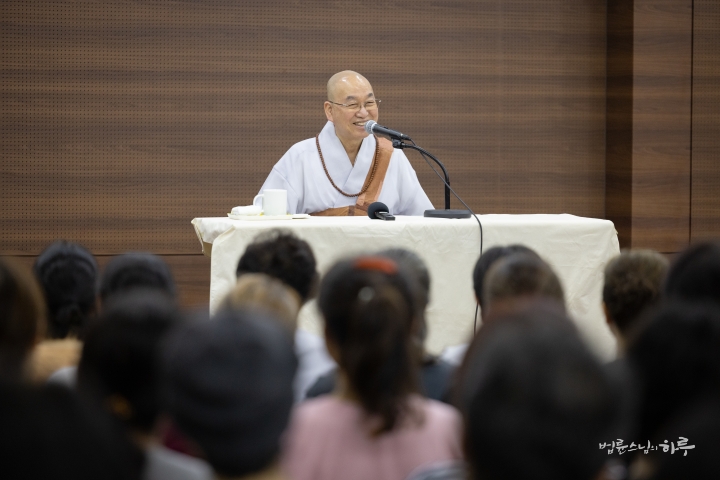
Real Practice Is Continuing Even When It’s Difficult
Practice means going beyond likes and dislikes, transcending understanding and not understanding. Only then can you reach an unwavering state. However, this doesn’t mean that Jungto Society demands mystical faith. You may find it difficult to do 108 prostrations or meditate for 10 minutes every day. But if you participate in a 4-night, 5-day meditation program and meditate all day, you’ll realize that 10 minutes of meditation is nothing. If you do a thousand prostrations every day for a week, 108 prostrations will feel like nothing at all. Even if you think your company life is hard, once you serve as a bus leader or group leader on a pilgrimage to India’s sacred sites, you’ll think that company work is nothing. Our minds are always comparing. Sometimes work actually feels easy because the amount is small. Other times, after experiencing more difficult tasks, what we previously thought was hard no longer feels difficult at all.
However, when difficulties arise, most people skip their practice, saying it’s too hard. This means they lack the strength to overcome difficulties. This tendency seems even stronger among today’s online generation. Actually, morning practice is something you can do or not do. But when you practice consistently every day, it becomes your strength. Especially when you don’t want to do it, when you’re busy – that’s when you need to practice more, because that’s when it truly becomes your inner strength.
Anyone can do something when they enjoy it. So doing something because you like it might show diligence, but it doesn’t build inner strength. You need to be able to continue steadily even when you don’t want to – that’s when you develop real inner strength. Practice steadily every day, but about once a month, set a date to do 300 or 500 prostrations. Prostrations are physically demanding, aren’t they? When you overcome that difficulty yourself, you develop the strength to overcome criticism from others, difficult situations, or emotional turbulence.
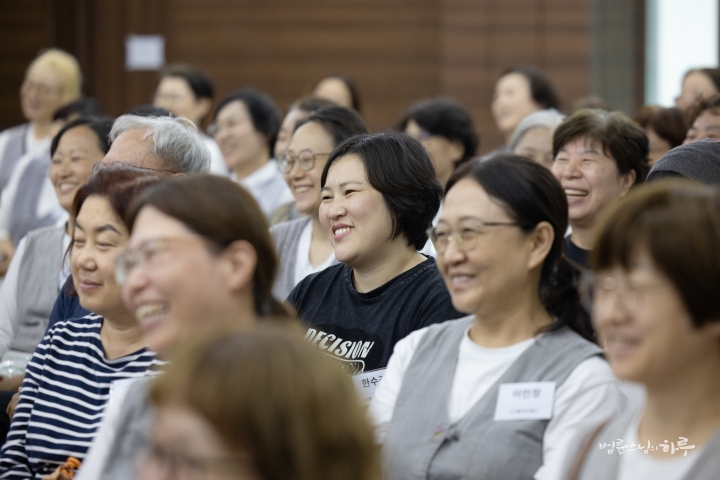
When You Don’t Feel Like Practicing, That’s When Your Inner Strength Grows
These days, most people who study online have joined Jungto Society because they genuinely wanted to. As a result, if something doesn’t sit well with them, they can immediately turn off their computer. While the online format has the advantage of easy access, it also has the disadvantage of allowing people to easily close their minds. That’s why the rate of people joining and leaving Jungto Society is increasing. They start with enthusiasm, but when their feelings change, they quickly leave. This happens because they lack the strength to overcome difficulties. Today’s younger generation has less experience dealing with hardship. Since they tend to pursue only comfort and pleasure, their ability to endure difficulties is weak. On the other hand, older members have lived through relatively difficult times, so they have the strength to overcome challenges.
When assigning difficult tasks like the India pilgrimage, it might seem that young people would do well while older people would struggle, but in reality, it’s often the opposite. Older members may find it hard for a day or two, but they quickly adapt. They say, ‘This is how we all lived when we were young,’ drawing strength from their past experiences. In contrast, young people lack such experiences and tire easily.
However, we can’t go back now and try to experience hardship by starving ourselves, getting sold to a shrimp boat, or going to prison. That’s why we need to practice more diligently in our daily lives. While daily morning practice has meaning, we need to add something extra for it to become true practice. Whether it’s 300 or 500 prostrations, setting a specific number and doing them consistently helps build the willpower to overcome difficulties. This is how we develop the strength to face life’s challenges. If we only pursue what feels good, our ability to overcome difficulties will continue to weaken. I hope that at least those of you who have become leading members will practice a little more diligently.”
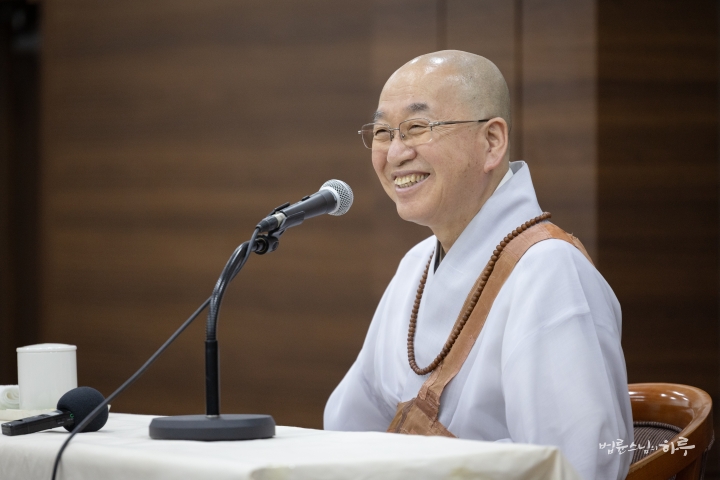
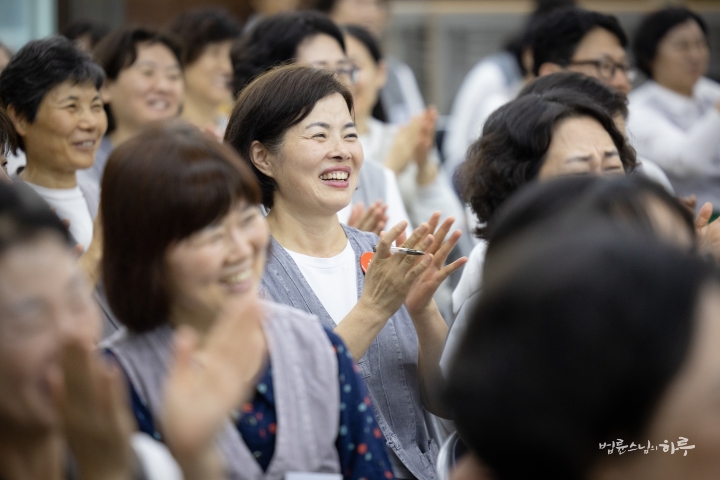
With loud applause, the meeting with leading member trainees concluded, and everyone went outside to take a commemorative group photo together.
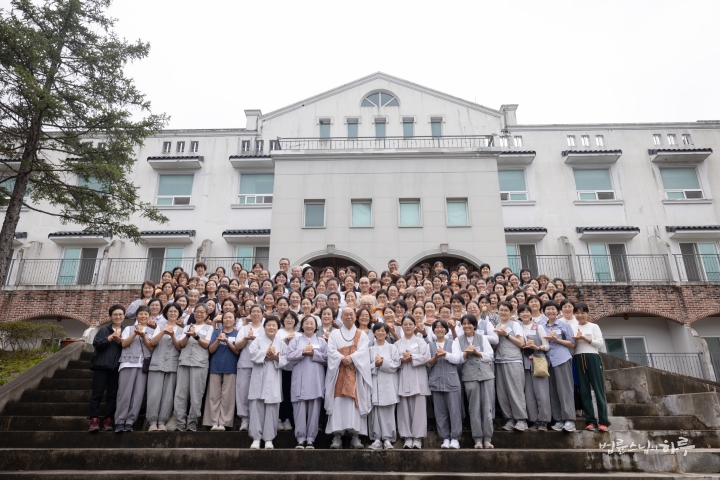
Shortly after, the Happy Citizens volunteers who had finished their outing to Seonyudong Valley arrived at the main auditorium.
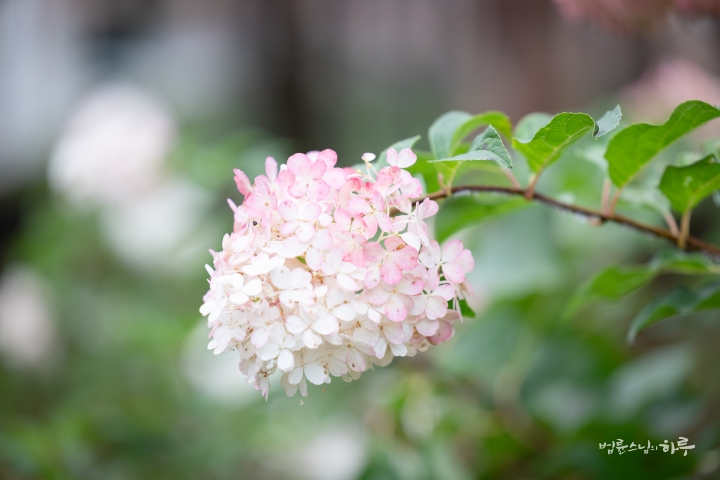
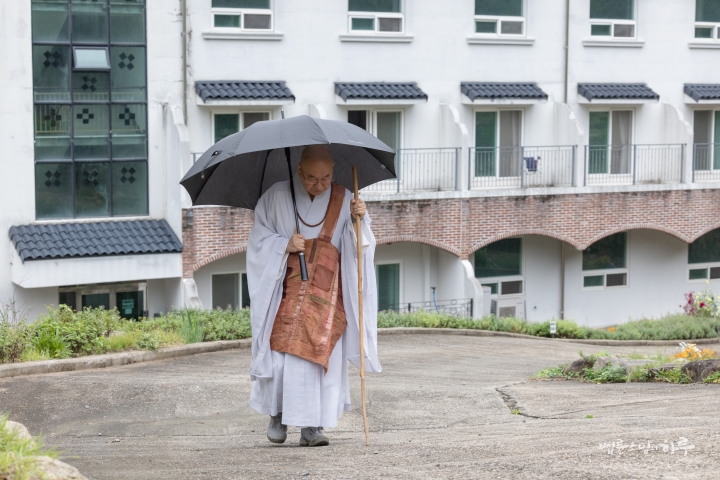
At 1:30 PM, the Happy Citizens volunteer training officially began with the emcee’s booming voice. First, everyone recited the Happy Citizens’ Promise and the Happiness Practice Text together, followed by a joint performance by the Ilsan Happiness Center and Deokyang Happiness Center. For this performance, they had just one meeting! Just one rehearsal! And just one performance! They prepared it short and sweet.
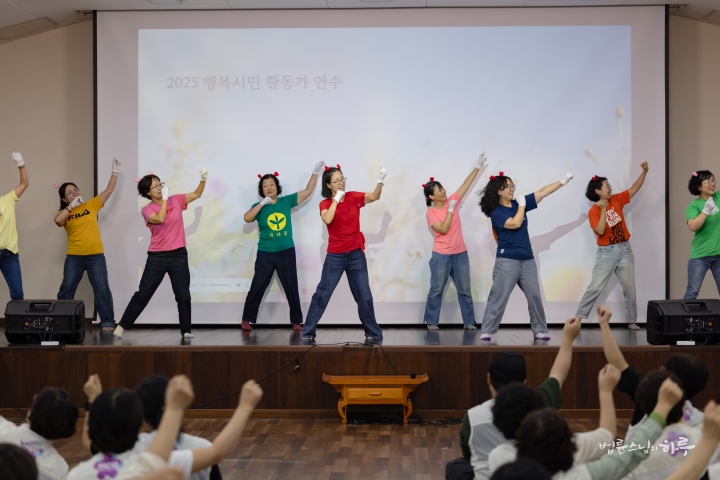
After the performance, there was time to showcase Happy Citizens activities. Four Happy Citizens took the stage to sincerely share their journeys and transformations of heart.
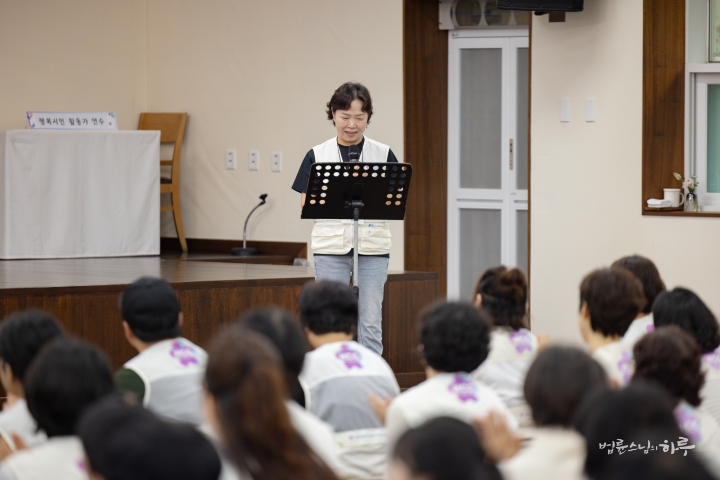
“I carried life’s burdens from a young age, filling the void left by my mother who ran away due to family discord. After finally finding stability later in life, my husband suffered a stroke. At that time, I cried thinking, ‘I’m destined to be unhappy.’ However, my life changed when I found comfort through Venerable Pomnyun Sunim’s Dharma talks and discovered Happiness School. My husband is still ill and my mother has dementia, but I’m no longer suffering. Since I’m not suffering, happiness has found me. Happiness was always by my side; I just couldn’t see it. Happiness School was like a magnifying glass for me, and now the happiness beside me appears very large and clear.”
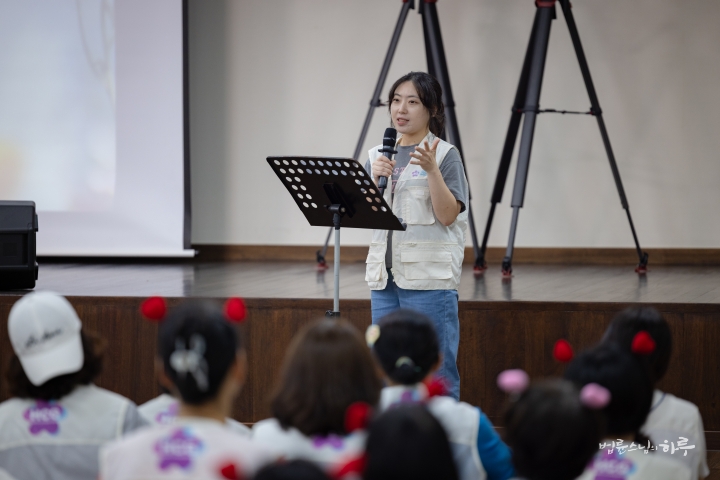
“I used to enjoy writing and kept a diary by myself, but then I became a Happiness correspondent. At first it was burdensome, but I felt supported as others read, edited, and helped me. I was proud that my writing could help others even a little, and I was happy that our center’s activities enriched the Happy Citizens website nationwide. Feeling that my small sincerity and heart reached someone, I realized this wasn’t solitary writing but happiness created together. My effort was small, but the reward returned to me greatly.”
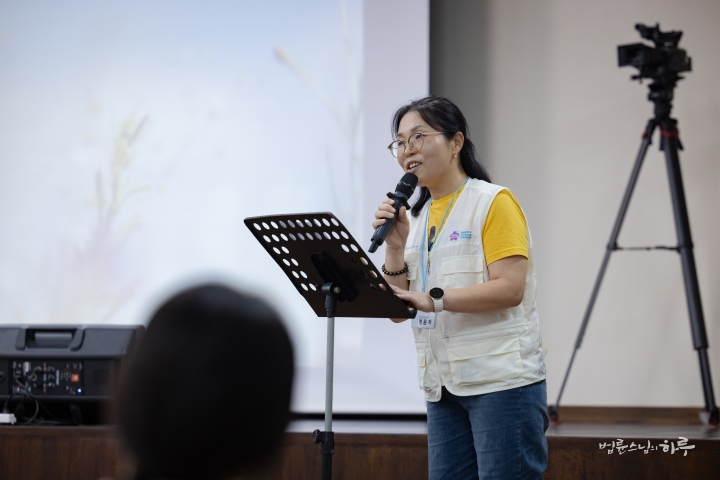
“I went through a difficult time when I transferred to university in 2020, and Happiness School helped me look into my heart. Like the saying ‘Don’t throw stones into muddy water, let it settle!’ I realized I was so focused on the arrows that hit me that I didn’t consider those hit by the arrows I shot. Learning to observe changes in my mind from a step back, I came to accept things thinking ‘That’s good’ whether they’re good or bad. Also, moved by Sunim’s words that our small actions can delay the climate crisis even by a day, I naturally participated in various activities like using handkerchiefs, environmental campaigns, and flea markets. I felt that practice that flows naturally without forcing is true happiness, and now my life has become much lighter and freer.”
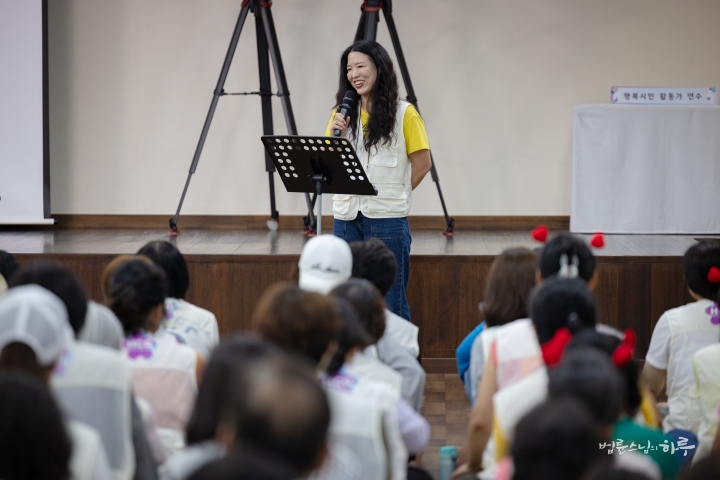
“After taking charge of facilitating Happiness School, I listened to the same Dharma talks repeatedly but gained different insights each time, feeling those teachings seeping into my life and gradually changing me. Once, when I received a text from a participant saying my post in the group chat made them uncomfortable, my heart wavered, but soon I thought, ‘That could happen.’ At that moment, I experienced with my heart what I had only known intellectually from Sunim’s words. That day, I felt for the first time that I could be free from emotions. I’ve become truly happy through Happiness School, and I’ll continue to spread and share about Happiness School unless someone stops me.”
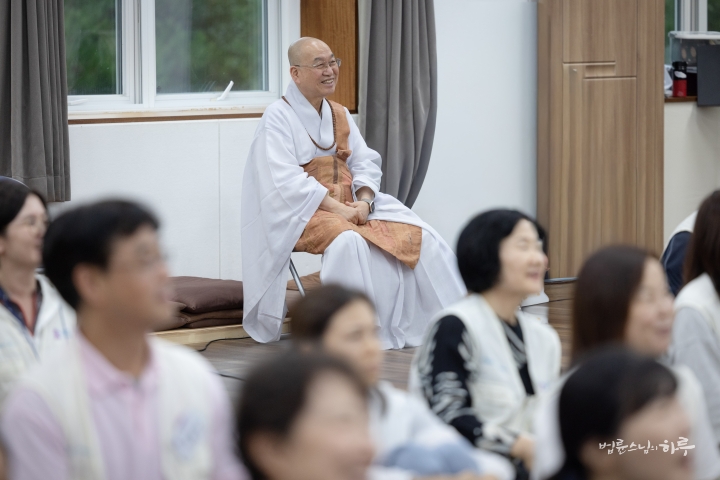
Each person’s story contained the courage to overcome suffering and the wisdom of life realized through practice. When the emcee said, “It’s been a long time since I felt this good listening to others share their stories,” everyone laughed heartily.
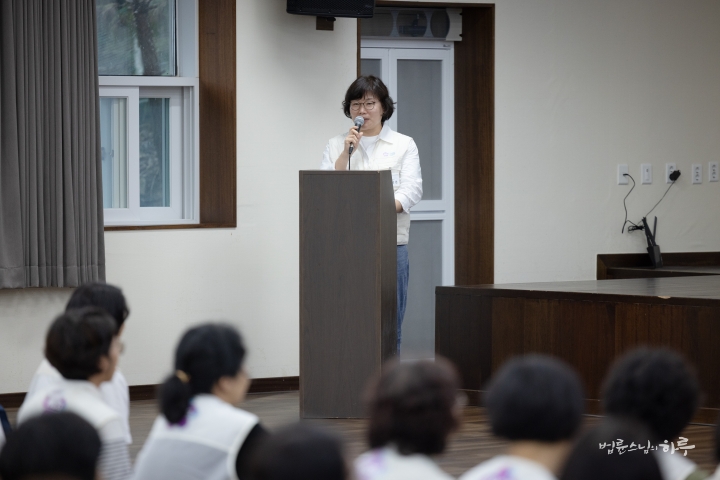
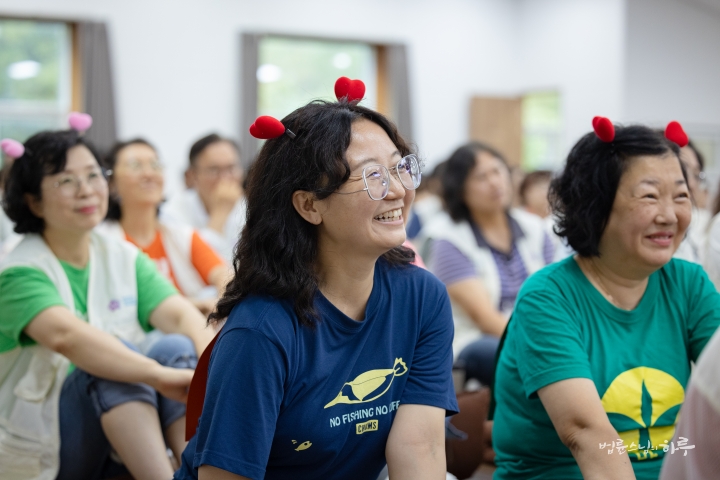
Next was the Dharma Q&A session. First, Sunim talked about the rapidly changing global situation and social changes, and discussed what mindset Happy Citizens should have while engaging in their activities.
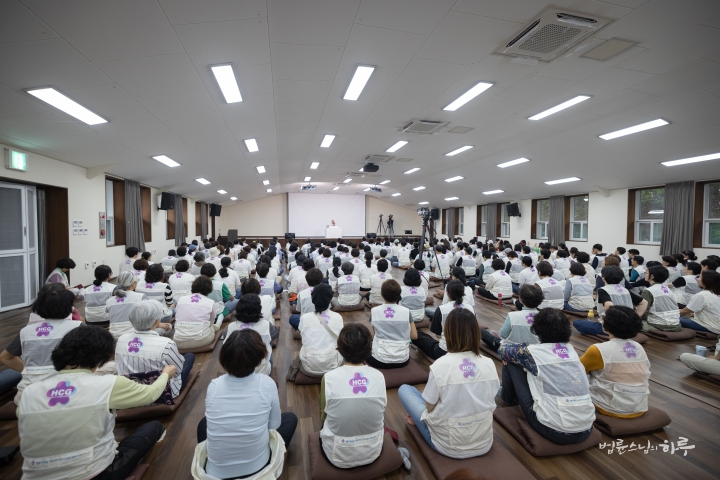
“Not just in the United States but worldwide, food prices have nearly doubled as labor costs have risen since the COVID pandemic. With prices rising so much, what about actual living conditions? While GDP and salaries have supposedly increased numerically, Americans’ actual standard of living has dropped significantly. The wealth gap has also widened severely – the rich have money piling up like mountains, while the majority of citizens find life increasingly difficult due to inflation.
Even When the World Shakes, I Must Protect My Own Happiness
So what about the global situation? Conflicts between nations are also growing. Looking at leaders of various countries, we see more figures with macho tendencies. Being a woman doesn’t necessarily mean being gentle. Like in Japan, tough female leaders are emerging too. These conflicts continue seriously enough to resemble civil wars, both domestically and around the world.
Right now in the US, the federal government is in shutdown because the two parties can’t reach an agreement. Since they can’t pay civil servants’ salaries, they can’t come to work. The bigger problem is special job categories like air traffic controllers. These people must work even without pay, but they’re taking vacation or sick leave, causing severe staff shortages. At this rate, it might only end when there’s a plane accident. Like this, confrontation and conflict are deepening not just in our country but around the world.
If this continues, we might head toward another major collision like before World War II. Or we might move to a new system through this process of chaos. Hopefully we can transition to the next generation without great suffering like war, but historically, humans have repeatedly made foolish choices during such transitional periods. Often, we only reflect and improve after making a major mistake once.
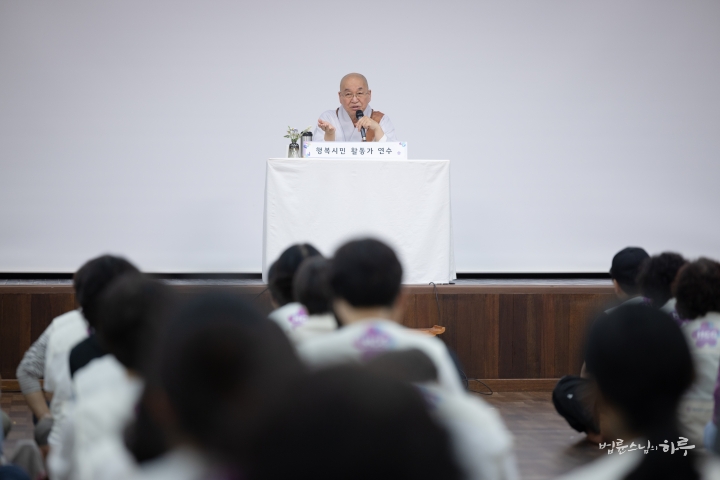
Recently, when China tightened regulations on rare earth minerals, President Trump announced he would impose 100% additional tariffs on Chinese products. As a result, stock prices plummeted overnight. When the market can fluctuate so dramatically due to non-economic factors like a single political statement, those who have advance knowledge of such information can make huge profits without lifting a finger. When even areas that should be fair are swayed by money, the world inevitably becomes chaotic.
This phenomenon will only intensify in the future. Yet we must continue to live within it. If we get swept up in the chaos, our lives will be shaken along with it. That’s why, especially in times like these, we must stay alert and maintain our equanimity to protect our individual happiness. Furthermore, we should contribute to stabilizing the world, even if just a little, beyond maintaining our own inner peace.
Regardless of the outcome, the result itself isn’t what matters. What’s important is doing our best while heading in the right direction. I believe this is the spirit behind the creation of the Happiness School and the Happy Citizens Movement. Everyone has the right to be happy. Anyone can be happy and live happily. No matter what situation we face, we shouldn’t give up our happiness by blaming others. We must protect our own happiness, and furthermore, it’s our role to help others be happy too. The Happiness School is a place for becoming happy ourselves, while the Happy Citizens Movement is a field of practice for helping others find happiness. The Happy Citizens activities are being carried out from this perspective.”
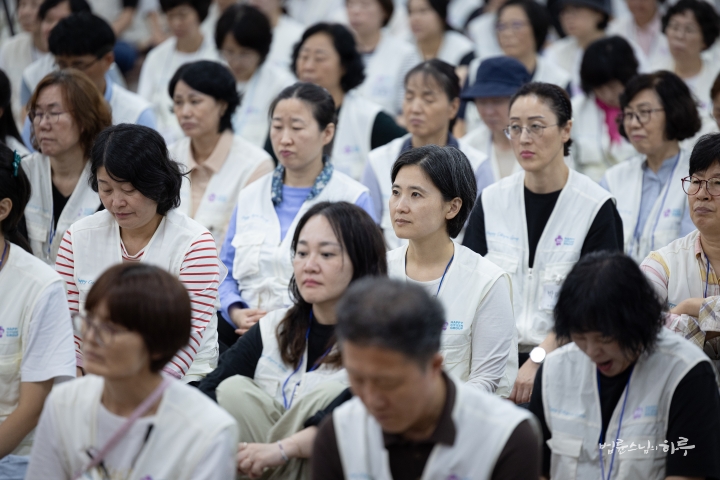
Next, anyone could raise their hand and have a conversation with Sunim about questions or difficulties they had while engaging in Happy Citizen activities. Over the course of two hours, eleven people asked Sunim questions. One of them shared that while their mind had become much more at ease after graduating from Happiness School, they still wanted to clear up the subtle disturbances that remained, and asked Sunim for advice on whether this desire was greed.
My Mind Has Become Peaceful, but Is Wanting to Become Even Clearer Greed?
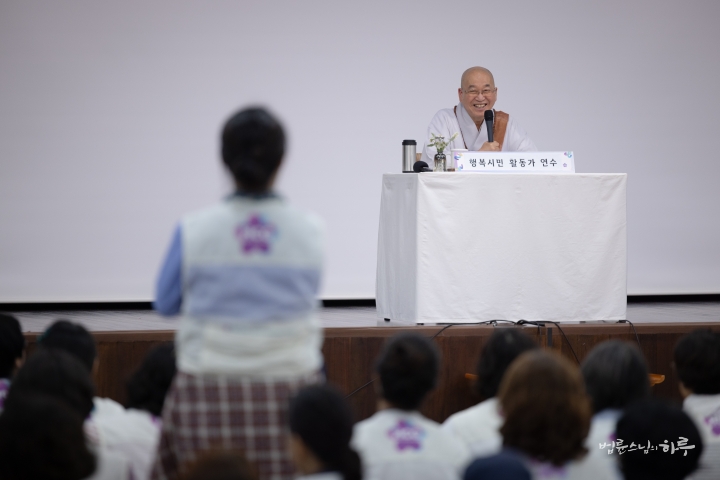
“You can’t even crawl yet, and you’re already trying to fly?” (Laughter)
“Do I still have a long way to go?”
“Would it be better to always be muddy water that’s opaque, or to have the mud settle so the water on top is clear?”
“It’s better for the top to be clear.”
“Then would it be better to occasionally get stirred up and become murky before settling again, or to remain continuously murky?”
“It’s better to occasionally become murky. So am I on the right track?”
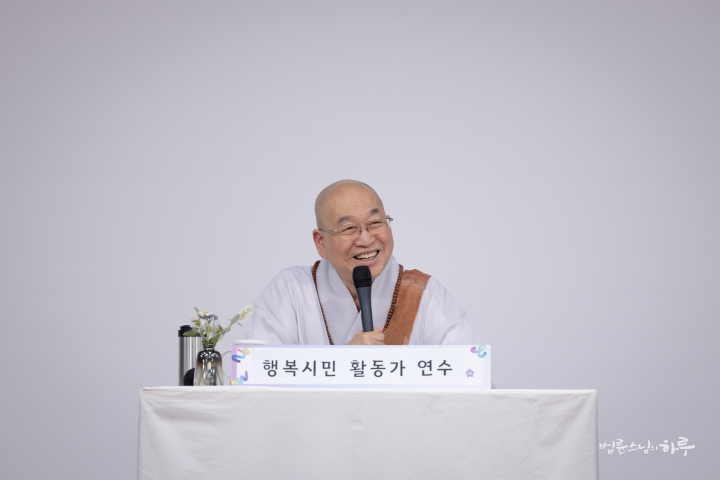
“You’re on the right track. But the question itself, ‘Can I continue to maintain a happy mind?’ is wrong. Because continuing to maintain something goes against the laws of nature. The law of nature is that all things are impermanent (諸行無常). In other words, everything changes.
When you observe change as it is, equanimity is maintained as a result. For any state of mind to continue unchanged doesn’t align with the principles of nature. For example, it’s impossible for the feeling of loving someone to last forever. That’s not the nature of the mind. You like someone, then dislike them – the mind is always changing. When you know that the mind is always changing, you don’t get too elated when things are good, and you don’t sink too low when things are bad. When that happens, as a result, the mind becomes consistent (如一). The idea that good feelings continue or bad feelings continue goes against natural law. So what’s needed is simply to observe the mind. When you feel good, you can recognize ‘I feel good right now.’ When you feel bad, you can recognize ‘I dislike this right now.’ Then the fluctuations of the mind become much smaller.”
“Should I just keep observing my mind like that?”
“Rather than trying hard to continuously observe your mind, just be aware. Always be awake. People keep thinking, ‘Once I attain enlightenment, I’ll automatically be awake from then on.’ But that’s like thinking, ‘Once I go to heaven, I’ll live eternally.’ In reality, it’s not like that. Such thinking is created by human desire.”
“I understand well. Thank you.”
“If you’re always aware of how your mind changes this way and that way, there’s no problem either way. At such times, you can say ‘My life is consistent.’ People sometimes ask me, ‘Venerable Pomnyun, are you always joyful?’ but that goes against the laws of nature. The mind sometimes feels joy, sometimes sadness, sometimes suffering, sometimes pleasure. When you know that this is the nature of the mind, you don’t get swept away by pleasant or painful experiences. The mind can waver back and forth. What’s important at such times is the attitude of being aware of that mind.”
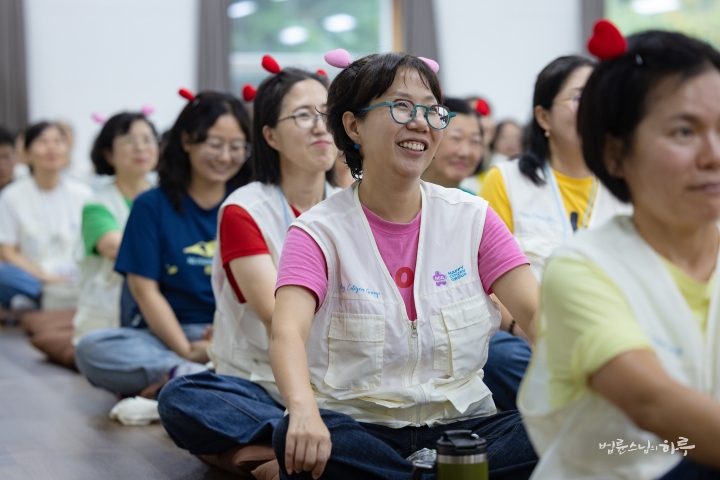
Questions continued to follow.
Morning meditation isn’t going well, and it’s hard to maintain routines while taking care of family. Does meditation done while drowsy have any meaning? How can I make happiness practice a consistent habit?
I feel the importance of practice, but as activities repeat, I feel like I’m falling into inertia. What attitude and mindset should I have when engaging in Happy Citizen activities?
It’s hard to find time because of childcare and work, and I hesitate to participate. How can I actively engage even when circumstances are this uncertain?
I’m in my third year as a Happy Citizen but still can’t control my emotions well. How can I manage emotions through practice?
I feel anxious and burdened about making mistakes when facilitating Happiness School. How can I let go of this fear and facilitate comfortably?
I’m in charge of a child with ADHD and depression, and I’m wondering if I should be their homeroom teacher again next year. Is it the right choice to continue taking care of such a child?
I’m living while hiding my background because of an inferiority complex about my education. How can I overcome this educational complex and live confidently?
I saw poor design results from a company and wondered ‘Should I accept that we’re just different?’ How far should we go in accepting differences?
My husband gets angry easily over small things, and I get infected by his emotions. How can we practice together with peaceful minds?
The last questioner was separated from her husband and asked Sunim for advice, saying her mind changes several times a day about whether to divorce or not.
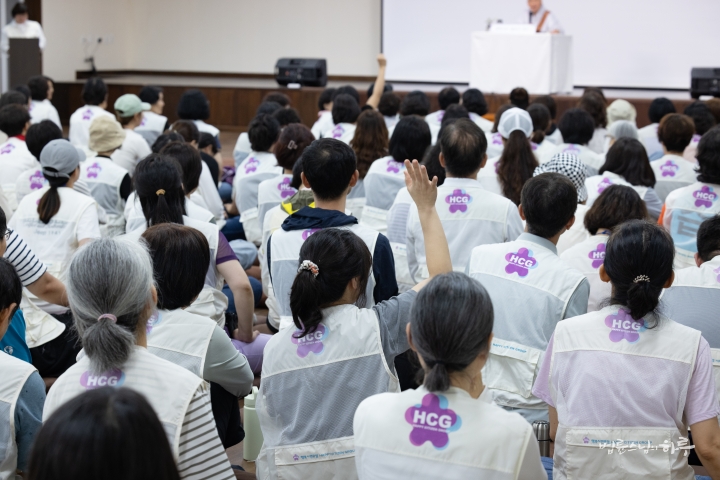
Should I Divorce or Not? My Mind Changes Several Times a Day
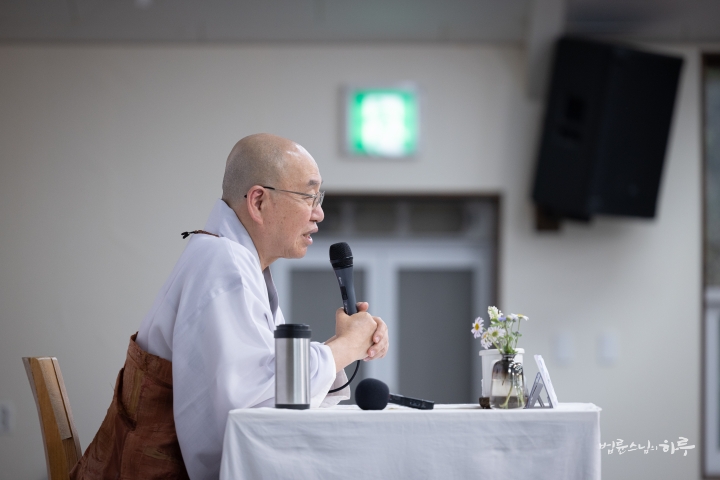
“Are you receiving hospital treatment?”
“No.”
“If you’re at the point where you’re wondering ‘Am I going crazy?’, you should go to the hospital first. Go to a psychiatrist and get treatment first. And if after treatment you’re still more than 70 percent certain that divorce would be better, then you can consider divorce. But if it’s fifty-fifty like now, it’s better to stay as you are.
Even in Jungto Society, when we try to change something, even if a majority agrees, if it doesn’t exceed two-thirds, we maintain the status quo. To make a change, at least two-thirds must agree, and even then we review it carefully. It’s the same when the Catholic Church elects a Pope, isn’t it? Realistically, a majority is the standard, but stable change is possible when it’s two-thirds or more.
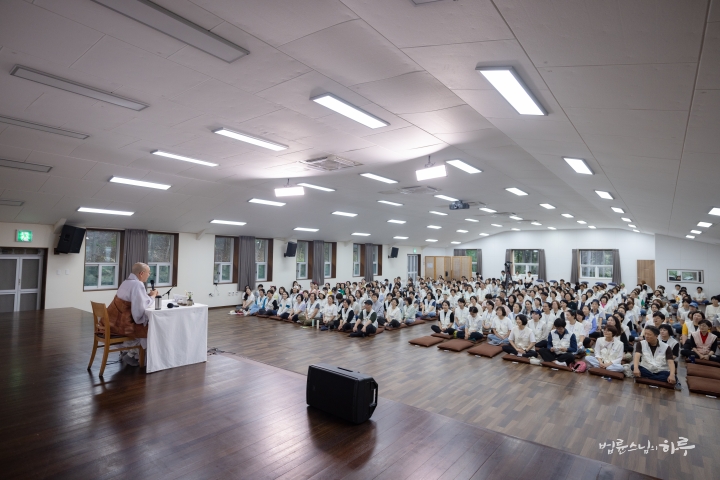
When a married questioner is considering divorce, they should only consider it when they are more than 70 percent certain that divorce would be better. If it’s about fifty-fifty, it’s better to maintain the current situation. And you should go to the hospital for treatment first, then make a judgment afterward. If after treatment you think ‘I can continue living together,’ then it’s better to stay as is. If after treatment your thoughts become clearer that ‘divorce would be better,’ then you can consider divorce. This isn’t your husband’s problem – it’s your own illness. It’s a problem that arose because your body and mind have weakened. So why are you enduring this without going to the hospital? Please get medical care first.”
“These days my body and mind are so exhausted that I feel completely depleted. My physical strength is weak, and trying to fulfill both the role of a housewife and daughter-in-law is too difficult.”
“Is there anyone here who doesn’t fulfill the role of housewife or daughter-in-law? This isn’t a matter of physical strength but a mental issue. Because there’s a mental problem, neither your body nor mind can keep up. So the first priority is to go to the hospital, get a doctor’s diagnosis, and receive treatment.”
“Yes, I understand. Thank you.”
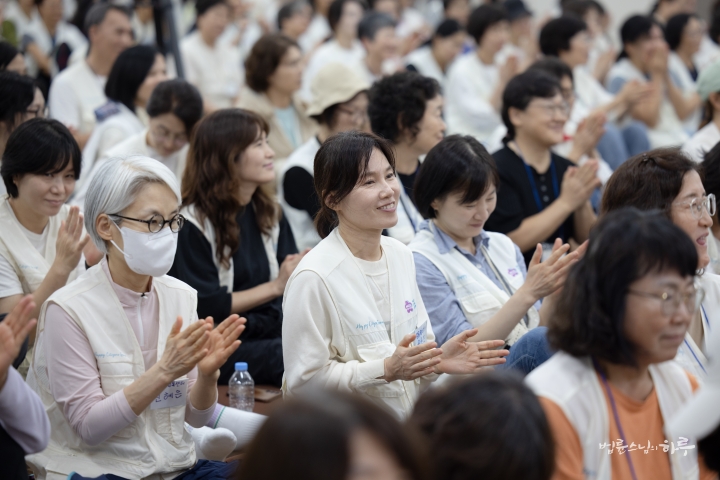
After finishing all the conversations, Sunim gave some final words of encouragement to the Happy Citizens.
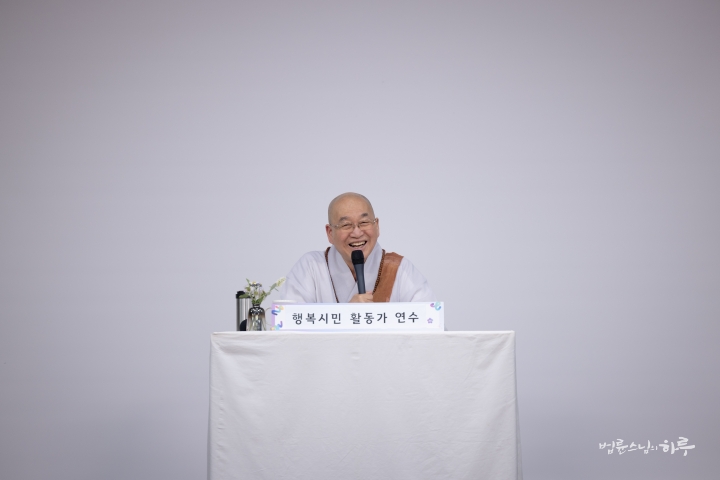
The More Chaotic the World, the More Those Who Live Righteously Shine
“The more chaotic society becomes, the more those who live righteously shine. A candle lit during the day is hard to see, but the deeper the night, the clearer its light becomes. It’s easy to think, ‘What difference can we make in this chaotic world?’ But that’s not true. Rather, the more disordered the world becomes, the more people like you shine.
If all the monks in our country were faithfully fulfilling their duties as clergy, there would be no reason for someone like me to stand out. But since everyone isn’t fulfilling their roles properly, even someone like me finds some purpose. So there’s no point in blaming others. Even though we’re not experts and are just ordinary citizens, as the world becomes more corrupt, the value of Happy Citizens shines even brighter. I hope you’ll take pride in this perspective and continue your activities.”
All the Happy Citizens sent grateful applause to Sunim, who had given his entire day for them.
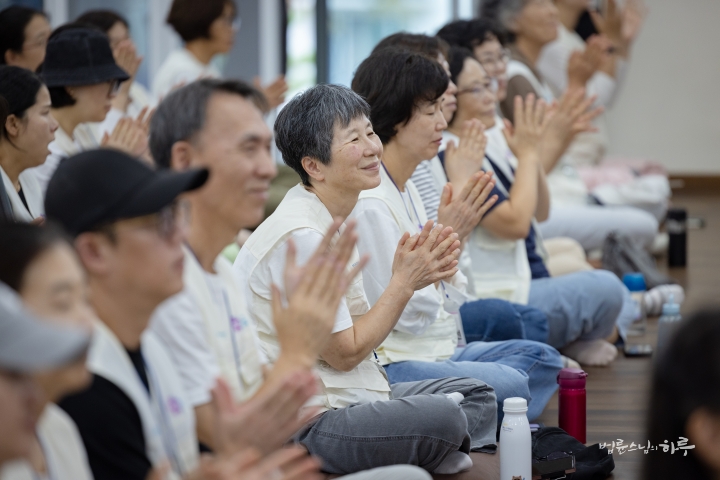
Though it was regrettable, it was already time to part. Everyone shouted the Happy Citizens’ closing greeting together, took a commemorative photo, and concluded the event.
“Let’s all be happy together!”
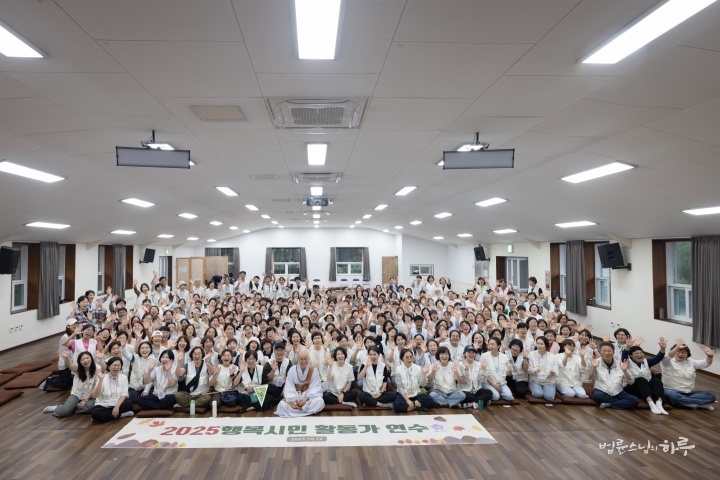
After taking the commemorative photo, Sunim expressed his gratitude to the staff who had worked hard, then headed to Seoul.

Departing from Mungyeong at 4 PM and driving on the highway for 2 hours and 20 minutes, Sunim arrived at Seoul Jungto Center at 6:20 PM.

After sunset, Sunim spent the evening indoors proofreading manuscripts and handling administrative work before concluding the day’s activities.
Tomorrow morning, Sunim will have a breakfast meeting with social figures at The Peace Foundation, then conduct a live broadcast of the Leading Members’ Dharma Assembly from the broadcasting studio. In the afternoon, he will meet with social figures visiting The Peace Foundation, and in the evening, he will give a Dharma Q&A lecture hosted by ‘Gilbeot,’ a gathering of broadcasting, film, theater, and arts professionals.





